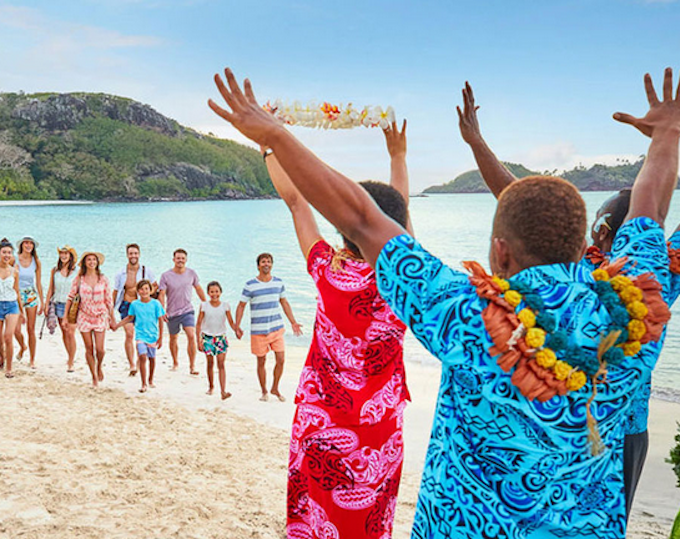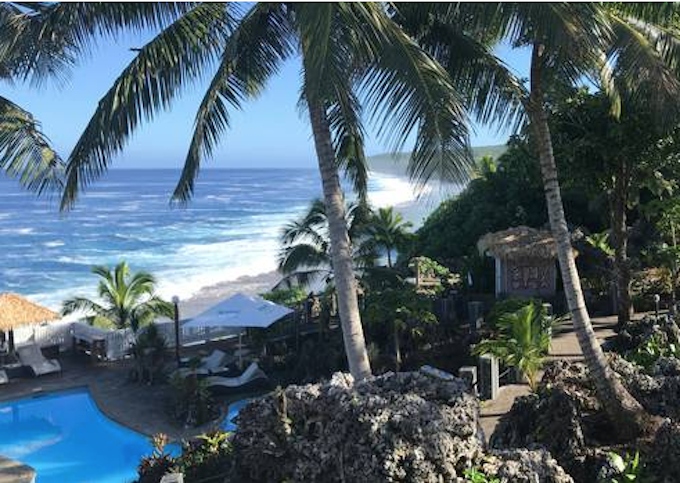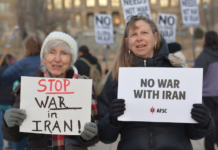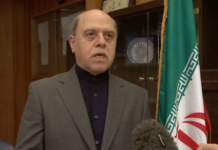A SPREP webinar about the Blue Pacific vision for the peoples of the Oceania region.
By Sri Krishnamurthi, reporting for the Pacific Media Centre
“Our journey to a bluer Pacific as we navigate through covid-19, we’ve all experienced the impact of covid-19 one way or another, our region has not been spared the adverse effects of covid-19. The focus here is to look at how are we maintaining the collective momentum in terms of protecting and conserving our ocean, emphasise ocean because our ocean speaks of who we are in this region, our ocean speaks of our joint identity, our entity, our shared ecosystem, our shared resources in the Pacific” – Kosi Latu, Director-General, South Pacific Regional Environmental Programme (SREP)
Unspoilt beaches, palm trees swaying in a zephyr of a breeze and the gentle sunlight dancing on the turquoise blue sea as the lapping waves shimmer on the breakwater make one imagine a Pacific paradise unspoiled.
But, that is until the best sounds come screeching like a broken record as it grates and gnaws away at the once-booming $4.2 billion Pacific tourism industry.
Tourism throughout the Pacific has been brought to its knees by the covid-19 coronavirus pandemic, throwing thousands out of work and fearful about the future.
READ MORE: InfoPacific – the geojournalism project

While Fiji and the Cook Islands have been desperately trying get their economies going with a Pacific bubble with New Zealand and Australia that has not come into fruition – and isn’t likely to any time soon.
Neighbouring New Zealand and Australia are concerned about the pandemic taking hold in the Big Blue that is the Pacific Ocean.
The Pacific Islands experienced a 6.6 percent increase of tourists in 2019 and the region welcomed 2.2 million visitors to the end of the year. Before covid struck, a boom year was predicted for 2020.
Over the short to medium term, visitor arrivals by air to the Pacific islands countries are predicted to grow by an average of 3.3 percent and expected to reach 2.7 million in 2024, according to the South Pacific Tourism Organisation (SPTO).
Established in 1983 as the Tourism Council of the South Pacific, the SPTO is the mandated organisation representing tourism in the region. Its 20 government members are American Samoa, Cook Islands, Federated States of Micronesia, Fiji, French Polynesia, Kiribati, Nauru, Marshall Islands, New Caledonia, Niue, Papua New Guinea, Rapa Nui, Samoa, Solomon Islands, Timor Leste, Tonga, Tuvalu, Vanuatu, Wallis and Futuna, and Taiwan.
In addition to government members, the South Pacific Tourism Organisation enlists a private sector membership base.
Pacific quick to close borders
However, the tourism markets of Cook Islands, Fiji, Palau, Tahiti, Tonga, Samoa and Vanuatu were quick to close their borders to prevent covid-19 entering their countries.

Emerging tourism markets such as Kiribati, Solomon Islands and Tonga are also closed to mass arrivals.
The lockdown has had a major effect with job losses, right throughout and in its March, Pacific Insight the ANZ predicted that Fiji now stands to lose nearly 602,000 visitors by air this year (a whopping drop of 67 percent). This translates into a F$1.4 billion loss in tourism receipts.

Vanuatu’s economy is expected to decline (down by 13.5 percent), as are Samoa (-18.7 percent), Cook Islands (-60.4 percent) and Tonga (-7.9 percent)
When you consider that tourism contributes to almost 46 percent to Fiji’s gross domestic product – about F$2.1 billion (A$1.4 billion) according to the June ANZ Pacific Insight – and it employs more than 150,000 people in various industries it is devastating.
Last year alone, Fiji had 894,000 visitors. The bulk of its tourists came from nearby Australia (41 percent) and New Zealand (23 percent), which like many countries around the world have banned international travel.
Asian Development Bank estimates for this year are that Cook Islands, Fiji, Palau, Samoa and Vanuatu will experience negative or no economic growth.
Heavily dependent on tourism
“Economies such as Fiji, the Maldives and Tonga are heavily dependent on tourism, with shares of tourism in total exports reaching 52 percent, 84 percent or 47 percent respectively,” the ADB report says.
“In many Asia and Pacific countries, more than three in four workers in the tourism sector are informal jobs, leaving them especially vulnerable to the negative impacts of the covid-19 crisis.
“Informal sector jobs are characterised by a lack of basic protection, including social protection coverage.”
Economic growth in the Solomon Islands is expected to slow by 1.5 percent in 2020, and Vanuatu’s economy to contract from 2.8 percent in 2019 to minus 1.0 percent in 2020, according to the ADB.
“The COVID-19 pandemic will severely hit tourism, with the South Pacific economies the most affected. Growth and fiscal outcomes will be undermined in the Cook Islands, Samoa, and Tonga,” says the ADB.
“The Cook Islands’ economy is expected to contract from 5.3 percent in 2019 to -2.2 percent in 2020 due to a collapse in tourist arrivals. Growth is forecast to recover in 2021 to 1.0 percent. Samoa’s economy is expected to contract from 3.5 percent in 2019 to -3.0 percent, before slightly rebounding to 0.8 percent in 2021.
“Tonga, where economic growth was 3.0 percent in 2019, will see zero growth in 2020 due partly to a plunge in visitor arrivals. Growth will likely reach 2.5 percent in 2021, buoyed by tourism,” the same dire predictions state according to the report.
Regional unity is needed
“The ocean is our shared resource and our shared responsibility, a regional unity is required, covid-19 has exacerbated our vulnerabilities as individual economies and as a region where timely health public and border protections have protected our people from the worst of covid-19,” says Dame Meg Taylor, current secretary-general of the Pacific Forum and Ocean Pacific and Ocean Pacific Commissioner.
“Today the focus of all national economies is to revive their economy activity and production in our Island nations with many already facing the grim reality of recession.
“Covid-19 has also presented with us with a valuable opportunity, an opportunity to link global recovery efforts with the goals of the Paris Agreement and the 2030 agenda for sustainable development we must act differently,” she says.
She adds that with collaboration and co-operation, things could be achieved in the Pacific both in terms of tackling climate change and sustainable eco-tourism.
“With strong regional co-operation and collaboration, we can and will achieve our priorities an example of this is the Pacific regional human pathway and forum leaders priorities particularly those of those of climate action and ocean governance.
“It allows the forum to strengthen its hand by acting differently, strengthen its strategic approach, and coherence and collective approach across three separate but related multilateral action such as the COP-26, the second United Nations conference and COP-15 on diversity,” she says.
It is up to the forum nations to find solutions.
‘We must act differently’
“It is time to act differently and innovatively, we must act differently, creatively and constructively to make our Ocean bluer,” Dame Meg says.
Meanwhile, Umiich Sengibau, Minister of Natural Resources, Environment and Tourism of Palau, and a past chairman of SREP who will chair Our Ocean 2020 conference in December has spoken about the difficulties that his country has faced in the starkness of the pandemic.
“Palau has been fortunate to be one of the few countries in the world to be free of coronavirus global lockdowns that have helped keep our people safe,” he says.
“As in many other places in the world, commercial flights have been suspended and borders are closed but it has also reduced our tourism revenue, over 40 percent of our GDP to zero.”
He was not sugar-coating the truth about his country’s economic plight.
“This matters because our tourism economy and ocean protection go hand-in-hand,” he says.
“When life under our pristine waters thrive that is how we attract visitors to dive in and see it for themselves. Tourism and protection are part of the same sustainable economy, and one is undermined then so is the other.”
Imperative to protect the ocean
Truer words could not be said.
“Palau recognises the importance of sustainable eco-tourism to support employment, livelihoods and ultimately sustainable development. This is why it is imperative that we protect the ocean.
And he spoke about the exclusive zone surrounding the island state.
“This year we began the implementation phase of the Palau, 80 percent of our exclusive zone some 500 sq km is now a “no-take” area. We know such protected areas foster great marine diversity, strengthen resilience to climate impact and provide respite to fish stocks.
“Everyone benefits from a healthy ocean.”

But not so in Fiji which has seen its tourism industry collapse with locals returning to subsistence farming as seen on the reports that proclaim the demise of the tourist industry.
Tourism accounts for 46 percent of GDP and many who work within the sector and associated industries are now jobless.
Key industy shut down
“Tourism in Fiji contributes 46 percent to GDP directly and was the highest foreign exchange earner at $2 billion plus a year,” says Fantasha Lockington, chief executive officer for the Fiji Hotel and Tourism Association (FHTA) based in Suva.
“It is also the key industry with the biggest multiplier effects throughout the 333 islands that make up the Fiji Islands. The closing of the borders therefore effectively shut down the country’s biggest employment sector.
“We estimate that around 110,000 tourism employed staff (directly) have been put on leave without pay, terminated (with little or no benefits) or made redundant (with payouts per contractual requirements),” she says.
“Fiji has no backstop for wage earner or salary support mechanisms. Instead, the government allows workers to access small amounts of their superannuation funds.
“Many of the larger resorts provided food support or a living allowance to assist their workers – the large majority of whom come directly from the communities and villages the hotels and resorts are located near and from whom the land is leased,” she explains.
“Fijian workers need their jobs back – the next three months will be the most challenging for them as they do their best to return to their communities and villages and get into subsistence farming to ensure they can feed their families,” she says.
Whether it is time for Fiji to invest in eco-tourism has grown along with concerns around climate change and the environment?
Great record of ‘being concerned’
“Fiji has had a great record of being more concerned about climate change and the environment.
“But we do not do enough to walk this talk. Large numbers of tourism operators practice environmental sustainability, implement recycling and energy renewal practices out of necessity and cost-consciousness (being off the main island grids and trying to ensure they protect their untouched and serene isolated locations).
“These are not recognised by the government in any way or often enough. Instead, the tourism industry is the only industry that is charged the Environment Climate Adaptation Levy (ECAL) – which is 10 percent.
“We have consistently requested that ECAL be reduced and spread to other industries that impact on the environment (mining, excavations and extractions of any kind, transport) or to allow environmental sustainability practitioners to get a credit back to both incentivise and change behaviour for the long term,” she sums up.
Then there is the vexed question of the Cook Islands which has tried desperately to twist New Zealand Prime Minister Jacinda Ardern’s arm.
Businessman Tata Crocombe who had shut his three resorts in the Cook Islands, losing 200 staff, was a little more pragmatic when he said “New Zealand produces 70 percent of the visitors to the Cook Islands and so it is our call and major market – and vital that we reopen to New Zealand visitors.
“More and more tourism operators are becoming involved in ecotourism and I expect this trend to continue into the future.
Making properties more eco-friendly
“There are a number of initiatives that the various hotels, resorts and accommodated is have taken to make their properties more eco-friendly. There are a number of tours that have focused on ecotourism such as lagoon cruises, turtle snorkelling tours, cycling tours et cetera. In addition, more and more restaurants are incorporating organic fresh Island produce in their menus.
“The growth in eco-tourism reflects the growth in ecologically thinking in the population more generally because human beings as a species need to learn to live in harmony with our environment in nature.
“We have been instrumental in the creation and preservation of marine sanctuaries in front of all of our three resorts which of become major visitor attractions,” he says.

Of importance to the Cook Islands is the economy, as well as safety of the people, says Jonathan Milne, editor of the Cook Islands News.
“At present, the New Zealand government is effectively blockading the Cook Islands, it’s economy and its people. It’s painful for people here to realise that the country regarded as our closest friend, our closest relative, would do that to us – and we pray they reconsider very soon before the economy of this proud little Pacific paradise collapses entirely,” he says.
“Tourism is 10 percent of the NZ economy. In the Cook Islands, with all the multipliers spreading its impact through retail and hospitality, it’s nearly 90 percent of our GDP. But equally important, the connected heritage of our nations, the shared constitutional history, the fact that we remain a realm country and our people are New Zealand citizens – these are ties that New Zealand leaders cannot in good conscience ignore.
“The Cook Islands is not competing with Queensland and Rotorua; some people want to go skiing, some want to go to the beach – they are complementary. We need to work together to strengthen the New Zealand dollar through strengthening our intrinsically inter-linked economies,” Milne adds.
Both economy and safety needed
The Cook Islands needs both the economy and the safety of the people, he says.
“We need both; they can’t be separated. With New Zealand’s assistance, our health and community systems are well-prepared to deal with covid. But we also need the support of our Pacific family, especially in New Zealand, to help reopen our economy.
“It’s all very well-staying safe from covid, the greater danger now is that we can’t pay for food and electricity. And the answer isn’t aid – it’s trade, it’s tourism, it’s getting our resorts and restaurants running.
“You know what they say – teach a man to fish. Well, we know how to fish, but we need tourists to enjoy what we have to offer. I can vouch for the yellowfin tuna, fresh off the boat,” Milne says.
It was a similar scenario in Vanuatu with 10,000 jobs lost.
“Tourism has been decimated here,” Liz Pechan from The Havannah Vanuatu, a five-star resort on the island of Efate, told the ABC.
“I was shocked for a little while, I think I was a bit dumbfounded: like how can this happen, how can the world just stop?”
Majority of hotels have no bookings
Like the vast majority of hotels, Pechan currently has no bookings, and more than 30 staff have already been let go.
Rising sea levels and climate change underscore the problems covid-19 has brought to the blue Pacific Ocean shores.
And while the economy is predicted to come right in a year or two, it will be mainly through sustainable eco-tourism that does not do anything to allay the fears of climate change.
This is the first of a series of articles by the Pacific Media Centre as part of an environmental project funded by the Internews’ Earth Journalism Network (EJN) Asia-Pacific initiative.












































I just need a safe world
So do you
In a time like this we all need a people with
Strong heart,mind and positive thoughts
to encourage the weak
Thanks to all who in a way or the other
Is helping to create the awareness and support the needy
#tegether we conquer covid19.
Comments are closed.